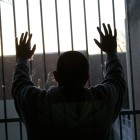
[Photos] Capturing Captivity From the Inside
|
Today on Bokeh, photos taken by youth inmates in New Mexico with the Fresh Eyes Project. Is the system’s failure to help them improve their outcomes evident in the way they document their surroundings?

Juvenile Justice Information Exchange (https://jjie.org/page/311/)

In late September, Torri was driving down the highway with her 11-year-old son Junior in the back seat when her phone started ringing.
It was the Hamilton County Sheriff’s deputy who worked at Junior’s middle school in Chattanooga, Tennessee. Deputy Arthur Richardson asked Torri where she was. She told him she was on the way to a family birthday dinner at LongHorn Steakhouse.
“He said, ‘Is Junior with you?’” Torri recalled.
Earlier that day, Junior had been accused by other students of making a threat against the school. When Torri had come to pick him up, she’d spoken with Richardson and with administrators, who’d told her he was allowed to return to class the next day. The principal had said she would carry out an investigation then. ProPublica and WPLN are using a nickname for Junior and not including Torri’s last name at the family’s request, to prevent him from being identifiable.
When Richardson called her in the car, Torri immediately felt uneasy. He didn’t say much before hanging up, and she thought about turning around to go home. But she kept driving. When they walked into the restaurant, Torri watched as Junior happily greeted his family.
Soon her phone rang again. It was the deputy. He said he was outside in the strip mall’s parking lot and needed to talk to Junior. Torri called Junior’s stepdad, Kevin Boyer, for extra support, putting him on speaker as she went outside to talk to Richardson. She left Junior with the family, wanting to protect her son for as long as she could ...

Today on Bokeh, photos taken by youth inmates in New Mexico with the Fresh Eyes Project. Is the system’s failure to help them improve their outcomes evident in the way they document their surroundings?

If you give an incarcerated kid a camera, this is what they see.

Attempts by Missouri legislators to override Gov. Jay Nixon’s veto of a bill that would have removed hundreds of individuals from state sex offender registries faltered earlier this month.

Earlier this month, North Carolina’s Department of Public Safety announced the consolidation of its adult and juvenile correctional offices.

Wisconsin attorneys are pushing to undo a law -- enacted in the mid-1990s in reaction to a wave of juvenile crime -- that puts 17-year-olds in the adult criminal justice system. The State Bar of Wisconsin is one of the lead groups lobbying for the "Second Chance Bill," a proposal that would put first-time, nonviolent 17-year-old offenders through juvenile court rather than adult court, where offenders can be sentenced to jail or prison.

The imagery conjured by the word prison is heavily influenced by Hollywood portrayals: razor wire, guard towers, bars, dank concrete cells, loud clanging and dangerous people.

Official interviews and evidence gathering will start soon in Meridian, Miss., a year after federal officials accused several agencies of operating a schoolhouse-to-jailhouse pipeline.

Massachusetts now includes 17-year-olds in its juvenile justice system. Only 10 states remain which place 17-year-olds under adult court jurisdiction.